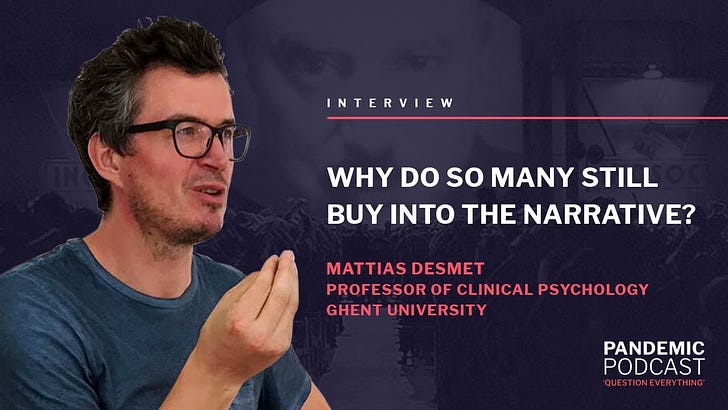“The simultaneous existence of four factors in many members of a population prime a society for exhibition of the overly-focused (“tunneling”5) group and individual behavior that supports totalitarianism:
Social isolation;
A lack of sensemaking in individual lives;
Abundant presence of free-floating anxiety; and,
Similar (consequent) abundance of free-floating psychological discontent.
If these four factors are present in enough members of any given society, Desmet says the society in question is at risk for the ‘crystallizing’ action of “mass formation” where large numbers of discontented, anxious, confused, and isolated people simultaneously and suddenly seize upon some single apparent threat and give it their entire attention and energy. The basic reason for this attention and energy seizure, according to Desmet, is that putting focus on a single apparent threat provides immediate and palpable relief from a constellation of the longstanding chronic pressures of social isolation, lack of sensemaking, and free-floating anxiety and discontent. This mobilization of individual attention and energy against some single perceived threat unfortunately, according to Desmet’s explanation of the phenomena, segues easily into increasingly totalitarian government behavior.
Desmet believes that this is exactly what has happened and is happening to greater or lesser degrees all over the globe in response to the COVID19 virus pandemic. He posits that – judging from measures of high and increasing drug use, increased job burnout and economic dissatisfaction, and increasing social isolation – that prior to the arrival of COVID19 a significant number of humans were extremely uncomfortable with their lives. With the arrival of the virus, however, they were able to unload their longstanding unfocused anxiety and discontent onto the ‘COVID19 crisis’, thereby obtaining a welcome and immediate release from their chronic discomforts and tensions. Desmet refers to the immediate feeling of relief felt by those previously heavily burdened with isolation, lack of sensemaking, and free-floating anxiety and discontent as a “mental intoxication”.
He says, further:
From this state of mental intoxication you can explain all of the rest of the phenomena of totalitarianism. The mental intoxication leads to a narrowing of the field of attention, it makes people only see what is indicated by the [mainstream] narrative. For instance, they see the victims of the corona virus, but do not seem to see at the cognitive level the collateral damage of the victims claimed by the lockdowns.
Mass formation [then] is actually a symptomatic solution for a real psychological problem. In my opinion, this crisis in the first place is a large societal and psychological crisis, much more than a biological crisis, let’s say.
As a consequence of mass formation people do not get egotistic at all. Rather, to the contrary, mass formation focuses your attention so much on one point that you can take everything from people, their psychological and physical well-being, their material well-being, and they will not notice it all.
Under mass hypnosis [mass formation] and subsequent totalitarianism [however], people become radically intolerant of dissident voices and so someone tells another story, or claims the official story is wrong, then this [dissenting] person threatens to wake the people up and they will get angry because they are confronted [again] with the initial anxiety and initial psychological discontent, and so they direct all their aggression at these dissonant voices – and at the same time they are radically tolerant for their leaders, for the people who pronounce the mainstream narrative.
In summary, joining with others to deal with a perceived crisis extinguishes the social isolation problem that plagues many people. Likewise, having a concrete and apparently serious problem to deal with provides sensemaking and a home for any previous free-floating anxiety.”
A note on ritual and its import:
And the importance of continuing to speak out - https://www.juliusruechel.com/2021/07/the-emperor-has-no-clothes-finding.html#Chorus




What? No human agency? Just zombies in a trance?
No, there is more to this than that.
I think Pavlov demonstrated these concepts with his dogs. Some people are uncomfortable considering how similar we are to dogs. We're sometimes more thoughtful about it but the results are about the same.
The difference between people and dogs is we're trained better. Usually. Poor training exacerbates the poor performance we see in many dogs, and many people. All four of the listed factors can be improved with proper training.